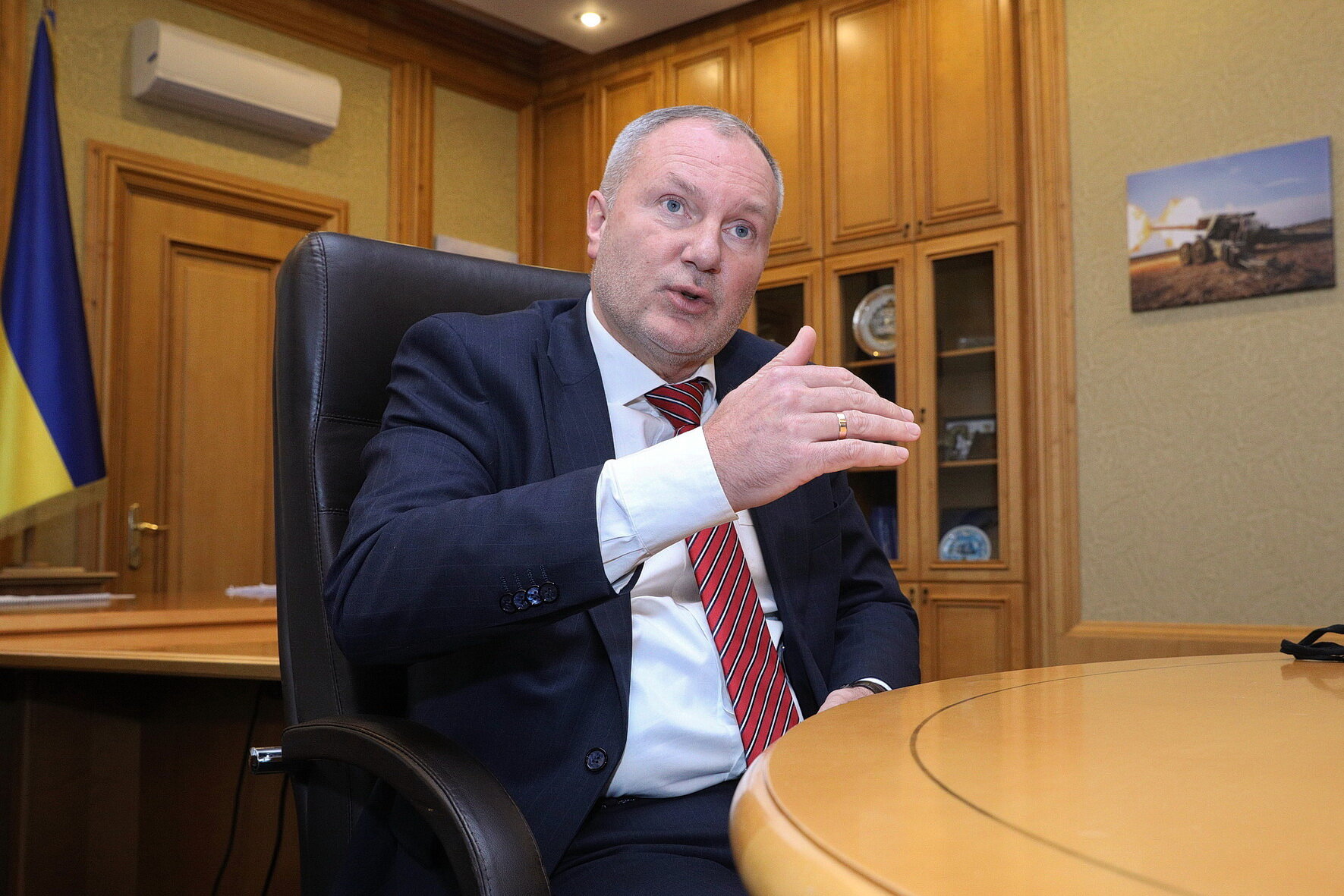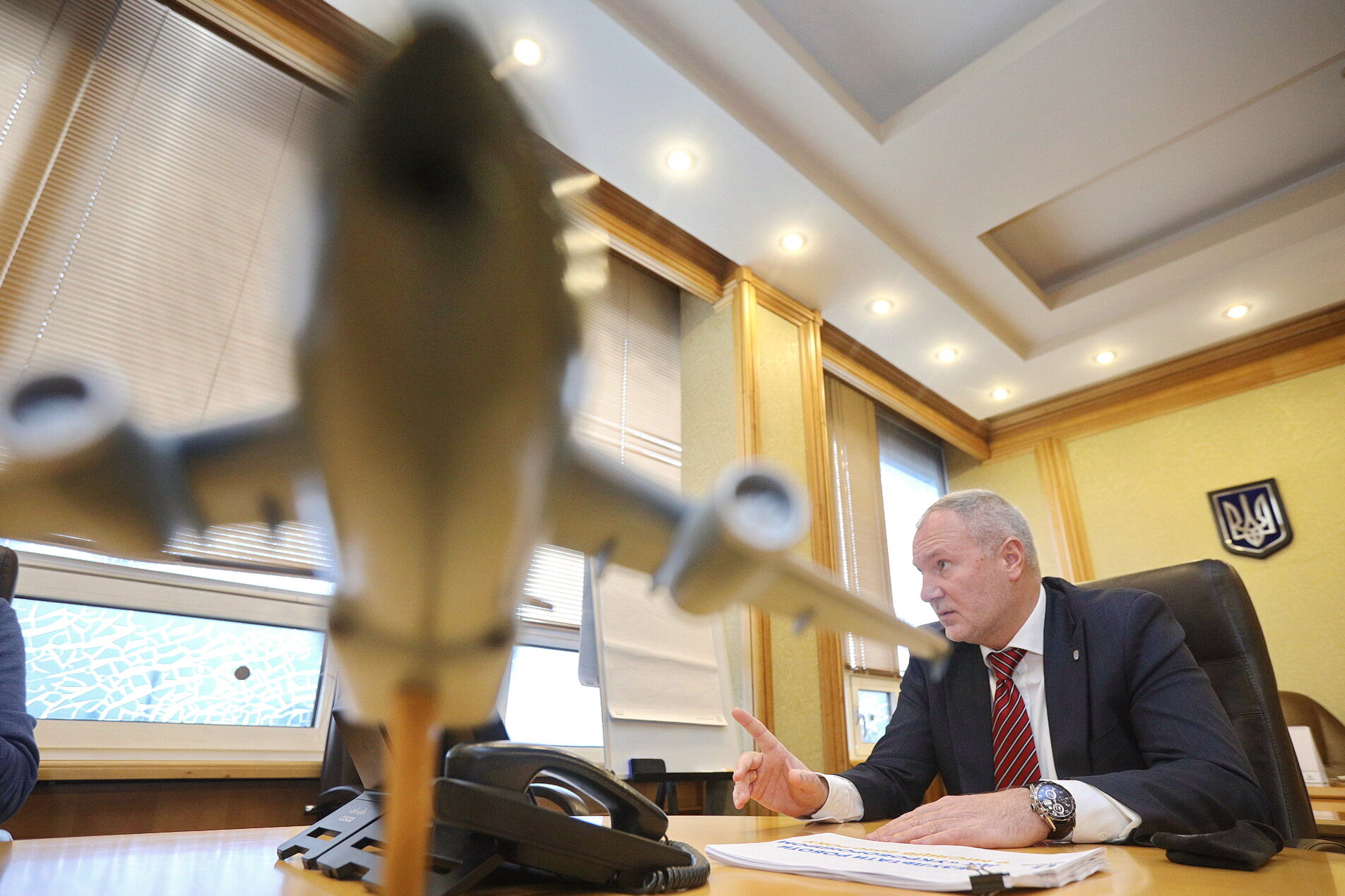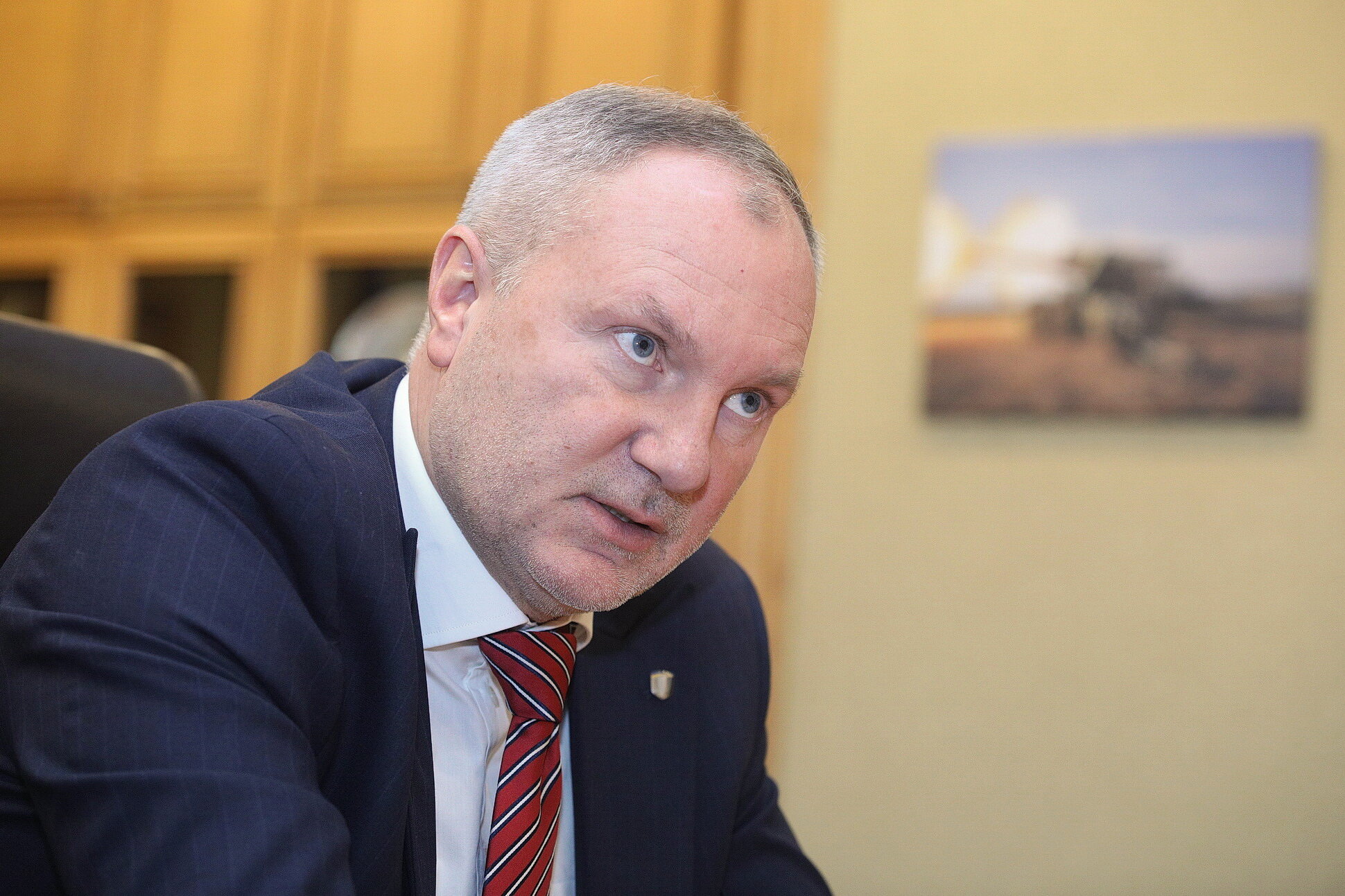The main battle for state defense giant UkrOboronProm is the one against corruption.
In this, a new management team has achieved some tactical wins against this enemy.
After former head Aivaras Abromavicius quit in early October, his responsibilities are now carried out by Ihor Fomenko, a member of his management team. Fomenko’s appointment was welcomed in the expert community, which feared setbacks in reforming the company’s 100 enterprises if a proxy for an oligarch got the top post.
In fact, Fomenko emphasized in a Nov. 2 interview with the Kyiv Post, there is no turning back to the dark and opaque ways of the past.
UkrOboronProm was created during the 2010-2014 era of ousted President Viktor Yanukovych. Its main purpose seemed to be siphoning profits from defense enterprises, since Ukraine’s defense capabilities collapsed under Yanukovych, leaving the nation vulnerable to Russia’s ongoing military invasion.
Fomenko says he will break up UkrOboronProm into several public holding companies after dead-weight assets are discarded or sold to private investors. If all goes well, UkrOboronProm as the world knows it today will be gone in a few years.
“Beyond doubt is the fact that UkrOboronProm, as a sub- or quasi-ministry, is going to lose its relevance,” Fomenko said.
“It won’t be necessary anymore. There will be a new business brand, and we will have to develop and nurture it.”

UkrOboronProm’s acting director general Ihor Fomenko talks to the Kyiv Post at the company’s central office in Kyiv on Nov. 2, 2020. (Kostyantyn Chernichkin)
Difficult times
In his farewell interview with the Kyiv Post, Abromavicius welcomed Fomenko’s rise. He described his former deputy as “a very decent man, a work addict” with expertise in his field and tougher as a leader than Abromavicius himself.
Fomenko has experience as a top manager in the automotive and mining industries. He has graduated from business management courses at the Berlin-based Institute of International Business Relations, the Harvard Business School, and the Paris-based business school INSEAD.
Reputable anti-graft defense watchdogs, such as StateWatch and the Independent Defense Anti-Corruption Committee, also hailed the appointment, highlighting Fomenko’s unstained reputation.
UkrOboronProm will need the expertise. It is quickly losing traction as a major global arms maker. In 2016, U.S. military magazine Defense News ranked the Ukrainian concern 62nd among the world’s top 100 arms manufacturers, estimating its total revenue at nearly $1.1 billion. The next year, it was 72nd, with slightly less revenue. And starting in 2018, Defense News ceased including the Ukrainian company in the annual top 100 ranking — even though UkrOboronProm reported $1.59 billion in revenue that year.
Weapons exports still account for nearly two-thirds of the company’s annual income, making it dependent on contracts from clients such as China, Pakistan, India, Saudi Arabia, and Turkey
The COVID-19 pandemic has slowed business and canceled arms exhibitions and travel. Among UkrOboronProm’s 68,000 employees, there have been at least 2,000 confirmed cases and 21 people have died. “That includes people with unique knowledge and competence,” Fomenko said. Most are still working remotely.
As of September, the concern had completed only 73% of its export activity plan for 2020, signing $398 million in contracts. As for state procurement in the defense sector, the target of nearly $1.1 billion has been met.
“We have a goal to ensure strong growth in production output and sales,” Fomenko said.
Full reorganization
But after all the high-profile corruption scandals, UkrOboronProm has a nasty reputation in arms markets, and may even be blacklisted by some importers.
Fomenko’s reorganization plan calls for the creation of two entities — Defense Systems and Aerospace Systems – to be created within the next few years.
Defense Systems will assume control of nearly 60 former UkrOboronProm enterprises divided into six specialized holding companies: armored vehicles, radar systems, maritime systems, special chemistry and ordnance, highly-precise weapons, and aircraft repairs.
Meanwhile, Aerospace Systems will assume control of predominantly civilian aircraft, engine, and space vehicle manufacturing. In particular, it will manage legendary aircraft manufacturer Antonov Company (which currently belongs to UkrOboronProm) and also several enterprises currently managed by the State Space Agency, such as the Pivdenne design bureau and the Pivdenmash factory in Dnipro, which are planned to be unified as the Pivdenniy Space Rocket Center.
According to the plan, all holding companies are going to have their own supervisory boards, corporate management, and a stock of shares, 100% of which will be owned by the government.
These are going to be full-fledged modern, state-owned arms businesses that have much more discretion and self-determination in decision-making and activities, according to Fomenko.
“For instance, regarding armored vehicles, they understand trends and what is going to be in demand. And they will have to shape their strategy and tactics (for themselves), including in foreign markets.”
UkrOboronProm is also known for its controversial practice of having so-called special export companies, such as SpetsTechnoExport or UkrSpetsExport, which have exclusive the right to carry out negotiations and strike arms deals in foreign markets. According to Fomenko, in the future, this ill-fated model will be changed as well, with the exporting companies losing their long-time monopoly.

UkrOboronProm’s acting director general Ihor Fomenko talks to the Kyiv Post at the company’s central office in Kyiv on Nov. 2, 2020. (Kostyantyn Chernichkin)
Dropping dead weight
UkrOboronProm will also have to discard dead assets. Among the concern’s 137 enterprises — 21 of them located in Russian-occupied territories — many are nothing but dusty old machines and empty walls.
“An investor could give them a second chance,” Fomenko said.
“An investor might resurrect the old production or find a new niche. But this is a chance for enterprises to continue (operating).”
But those are easy calls compared to transforming assets at healthy enterprises.
“Let’s talk about the Malyshev Tank Factory (in Kharkiv), which was designed to produce 900 tanks a year. How many tanks does it produce today? Zero. Hopefully, it will start to produce 30-50 tanks. They need to be optimized. The original cost of a tank will be lower, as our extra expenses are included in the production cost, which makes us uncompetitive in foreign markets.”
According to Fomenko, between 20–30% of UkrOboronProm’s resources are spent without bringing any benefit to the country’s war-time defense.
Corruption no more
For years, UkrOboronProm’s contracts in Ukraine and abroad, according to numerous investigations, were unfair and with inflated prices. Officials in charge of the contracts were often corrupt and would abuse excessive secrecy of the industry to secure contracts.
The new values introduced by Abromavicius and carried on by Fomenko are simple: “Don’t steal, work for the nation, don’t create conflicts with main clients.”
One way to deter corruption is to keep the salaries of key managers and average workers at competitive levels. However, UkrOboronProm’s average paychecks still do not look so impressive.
According to Fomenko, the average skilled UkrOboronProm worker earns $870-$1,050 a month at major enterprises. In smaller cities, the average enterprise salary is $420-$700. An entry-level manager gets $1,055 a month.
“Of course, we can’t keep up with private companies, where salaries at corresponding positions are 2-3 times higher,” Fomenko said.
“But since this is a state-owned company, the pay rate is generally acceptable. We do have people leaving us, but most hold onto their jobs.”
Fomenko receives $10,550 a month, lower than in the private sector for a similar position, he said.
“I have worked in private business for all my life, I know the pay rates,” he said. But when it comes to UkrOboronProm, “there are certain restrictions, and I accept them.”

UkrOboronProm’s acting director-general Ihor Fomenko talks to the Kyiv Post at the company’s central office in Kyiv on Nov. 2, 2020. (Kostyantyn Chernichkin)
Bureaucratic hurdles
Encouragingly, the military and Ministry of Defense seem to be ready to give lucrative contracts to the company’s factories.
After the Sept. 25 crash of an Antonov An-26 aircraft near the airfield of Chuhuiv, Oleh Uruskiy, vice-minister for strategic industries, asserted that the old Soviet airplanes were to be replaced by Antonov An-178s, which are newly-produced for foreign markets.
For Antonov, which in many ways survives thanks to cargo carriage services, this is a chance to finally get back to the big game as a major aircraft manufacturer with a 74-year history.
“We do hope a contract to produce three aircraft will be signed by the end of the year,” Fomenko said.
Another good sign for Antonov: While it is currently producing an An-178 for Peru under a $65 million contract, the Latin American nation is considering ordering yet another Ukrainian aircraft after a tender in 2021, according to Fomenko.
But Ukraine’s bureaucracy and poor efficiency of government decision-making often hamper the production of new modern weapons.
According to Fomenko, a very illustrative situation is currently unfolding around the Neptune cruise missile systems accepted for service in Ukraine’s Armed Forces in 2020.
Despite an urgent demand to defend Ukraine’s seas from Russia, as of November UkrOboronProm still hasn’t been given a contract to produce any missiles. For over two months, the Defense Ministry has been unsuccessfully trying to introduce amendments to the state defense procurement order and arrange a contract for the production of at least one Neptune missile division by the end of 2021.
Again, according to UkrOboronProm’s director, Ukraine’s defense industry is fully capable of completing such an order, but all initiatives are ruined by murky bureaucratic ping-pong in the Cabinet of Ministers and the procurement system.
“We’re not just ready to fulfill such a contract, we are interested in it,” Fomenko said.
“After we’ve completed the full circle of the development of a weapon, including trials and accepting it for service, we’re just obliged to manufacture it. If we’re not doing this, here’s a question: why did the government spend money on its development? That is not chump change.”
UkrOboronProm Fact Box
UkrOboronProm is an association of over 130 state-run defense production enterprises throughout Ukraine, the primary contractor of the country’s state defense procurement.
It was created in late 2010 under former President Viktor Yanukovych in order to consolidate control over the country’s strategic industries. The company has faced fierce criticism over endemic corruption and has a bad reputation in foreign arms markets.
It is involved in the modernization, repair, manufacture and export of munitions, weapons, military vehicles, aircraft, naval vessels, and special equipment.
Number of employees: 69,000
Wages: Hr 3,500-59,000 ($123-$2,000)
Net income: Hr 37.6 billion ($1.33 billion) in 2018
Biggest enterprises: Antonov Company (aircraft production, repairs, cargo transportation), Kyiv Armored Vehicles Plant, he Kharkiv Malyshev Factory (armored vehicles), the Luch Design Bureau (highly-precise weapons, special equipment).
